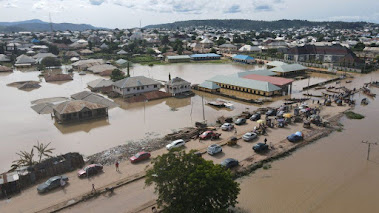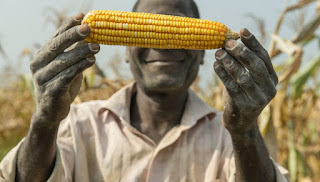COP27, data reliability and open data
So far, I have been blogging about flooding, drought and the effects on Africa. As I type, discussions at COP27 are shifting from prevention of climate change to adaptation and mitigation. Part of this was on the monitoring and how best to work together in response to climate disasters. As a response, I want to spend the next two blogs talking about mitigation strategies.
In our previous lecture, we were shown data from monitoring stations in Nigeria. There were some unusual trends within the data so Julian began investigating. He found that the maintenance of the monitoring stations had declined over the years, resulting in unreliable data. Things like this might not be flashy, but they are such a basic element of monitoring and early flood detect. Large conferences like the COP sessions always involve people wanting to make inspiring speeches and making bold promises. Damaged hydrometers being repaired or replaced doesn't result in the headline grabbing news they want so this almost becomes overlooked.
One solution I have been researching is the creation a platform for open data sharing in Africa. In the UK, we have data.gov.uk which is an open platform for businesses, government agencies and citizens to access and understand data on the UK. Removing the boundaries between government agency sharing improves trust of governments and can help early detection of disasters and reduce response times. The open source nature removes the financial boundaries for universities and government agencies from less developed areas. Most of the river basins within Africa cross international borders. Restricting the access to river data upstream could cause mass flooding downstream.
openAFRICA is an independent platform that is currently doing this. It allows citizens and governments to upload data related to Africa. Currently it is only run by volunteers. Creating a regulated and legislative body created for Africa to oblige governments to commit to data sharing could help to improve climate disaster detection. Instead of focusing on hollow promises, COP27 could've provided a springboard for innovative and unique solutions.





Your posts demonstrate a rudimentary grasp of water and environmental change issues in Africa. Interesting points were raised about the intersection of the hydrological cycle and food security that were not given much attention in the post on drought and food security in Kenya. You showed engagement with relevant literature and a great referencing format, but not in all posts. What are the social dimensions of groundwater abstraction for irrigation in Kenya? And is Kenya's agricultural sector dominated by smallholder farms? What proportion are non-smallholder farmers?
ReplyDeleteHi Clement. Thanks for your feedback! I will go back and add in some references that I missed for the first few posts and make sure to keep it update for future. Hope you enjoy reading the rest of the posts. Tim
Delete